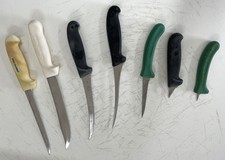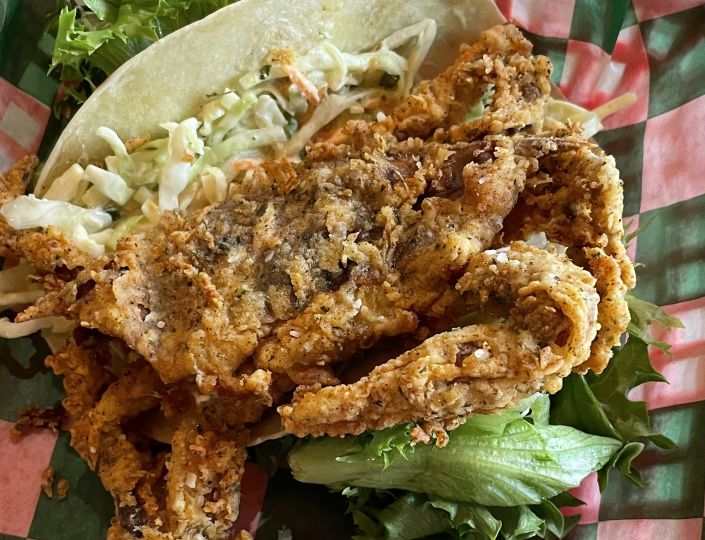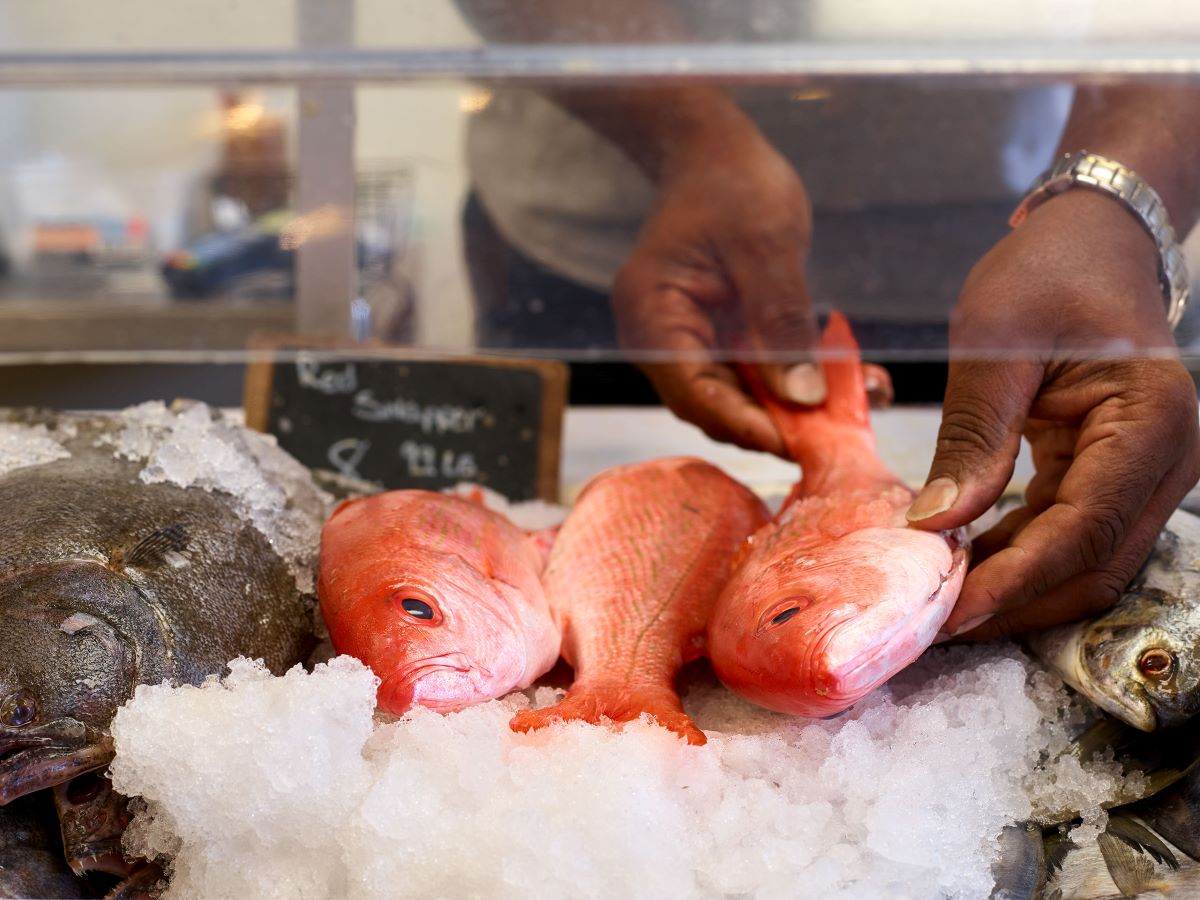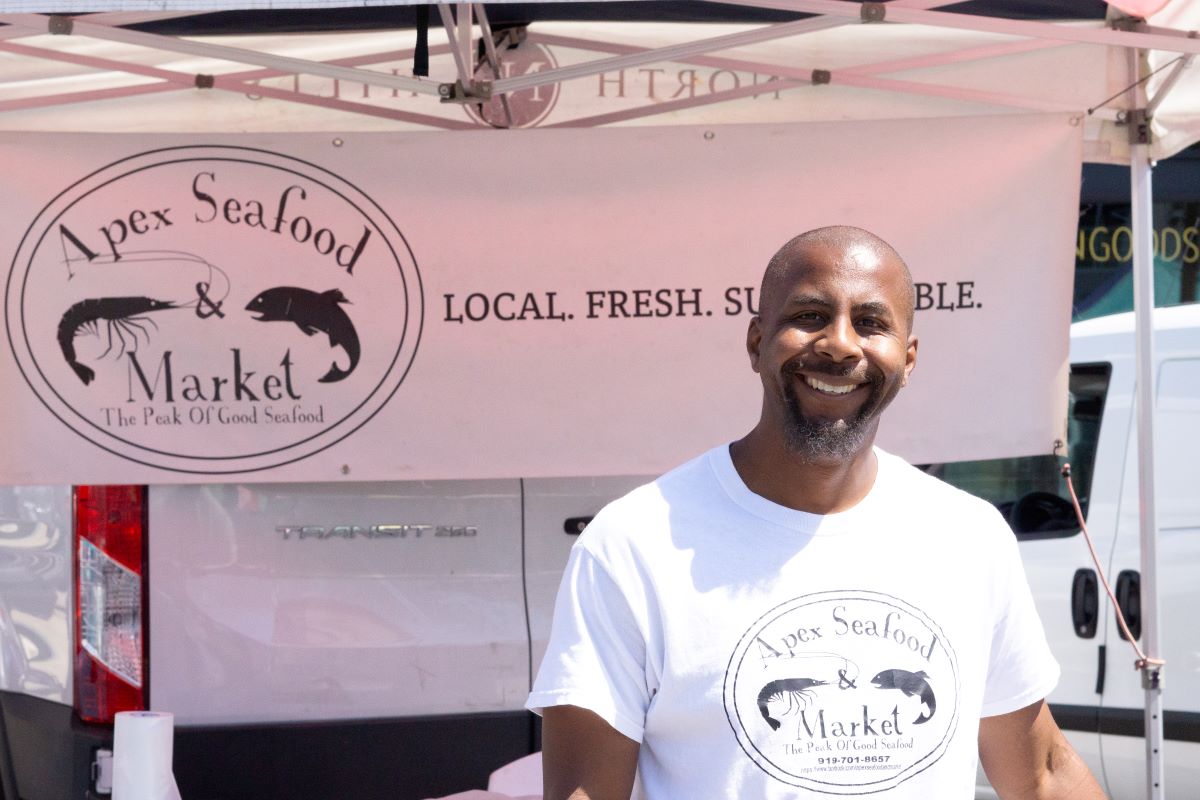Kory Reeves: The man who carves the 1,000-pound tunas
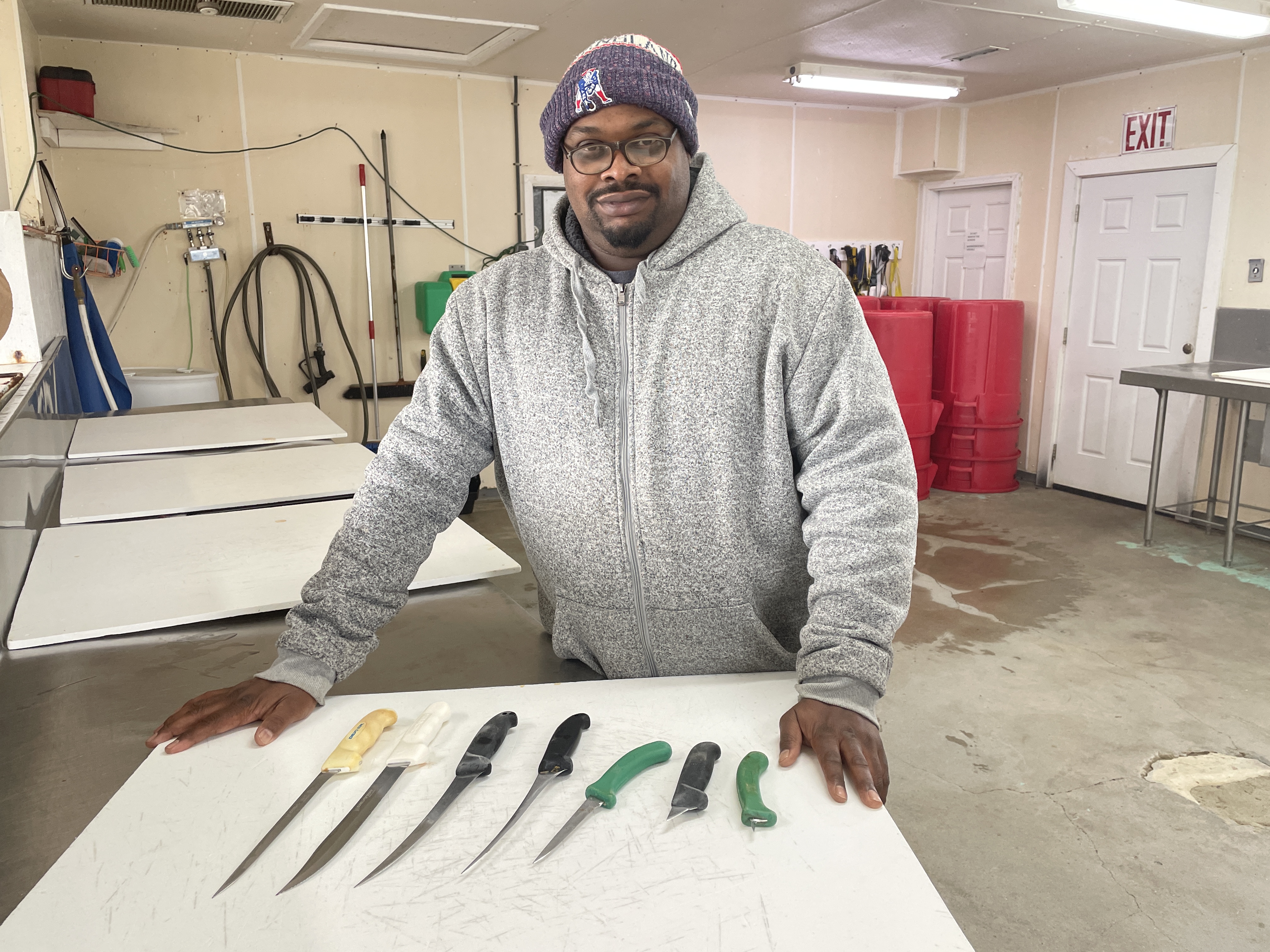
When monster tunas, up to 1,000 pounds, start running off the Outer Banks, Kory Reeves and his team sharpen their knives.
A lot of knives.
_________________________________________
This story is party of NC Catch’s “Recognizing African American Participation in the North Carolina Seafood Industry” project. North Carolina’s Black seafood business community has partnered with researchers in this historic project conceived by NC Catch to build understanding of the vital role African Americans and people of color play in the state’s seafood industry. Narratives, video and oral histories tell the stories of Black fishers, wholesalers, chefs and others working in seafood. A N.C. Sea Grant 2024 Community Collaborative Research Grant has helped fund the project.
_______________________________
Reeves is fish house manager at Oregon Inlet Fishing Center, where a fleet of some 50 charter boats ferry anglers offshore in search of legendary catches. Big tunas, record wahoos, prized mahi, mackerels, loads of blues, trouts and puppy drums. No matter what takes the bait, the fish cutters who Reeves supervises expertly dress and fillet trophy-worthy catches for fishers to take home.
“I mean, think about it. You catch an 800-pound fish, how are you going to clean that yourself?” Reeves said, standing over his own working collection of seven knives. Like all the fish cutters, Reeves customized each one to perform specific tasks.
Two knives he ground down to nubs melt through tough fish skin. His good luck charm, Bertha, is a long, silver sliver that looks like a surgical tool. Bertha actually started life as a wide knife. Reeves filed away at the blade until it became a precision filleter.
Kory Reeves knives, including two tracers on the far right.
Reeves’ job is not as clear cut as his knife skills. Managing the fish house means much more than carving the catch. The Kearney, N.J., native who lives in Columbia, N.C., wears many hats, from customer relations and record-keeping to keeping up with ever-changing fisheries rules. Still, he’s always ready to grab a knife when the fish cutters get busy.
And when you’re a fish cutter, you never know what you’ll run into. Reeves has seen a sand tiger shark with a stomach full of ball bearings, a tuna full of buckshot, a two-headed “frankenfish” and crossbreeds that appeared to be part pompano, part mahi.
A single dad who started as an Oregon Inlet Fishing Center fish cutter 15 years ago, Reeves shared his story in an interview with NC Catch’s “Recognizing African American Participation in the North Carolina Seafood Industry” project team. The following excerpts have been edited for length and clarity.
Before you moved to the N.C. coast, did you have any experience in seafood or fisheries or fish cutting?
None at all...apart from every now and then going on a little fishing trip or fishing off the docks and trying to clean (the fish) myself. After painstakingly learning how we clean fish, I realized that I literally never knew how to clean fish.
You started as a fish cutter?
I was a fish cutter for 10 years. And then I got into a management position after the previous manager had actually gotten into a car accident. I was already the former boss's number two…It was kind of like becoming a dad for the first time. You realize that whole time you thought that, oh, this would be easy. And then you realize after you get the position that, oh yeah, I gotta step up. Being a dad is not that easy.
How many cutters are on your crew?
Right now (January 2024), we are down to three. The majority of times when we have bad years, they will branch off to go and find other work until everything picks up and they will come back.
So, does your team stick around the fish house all the time or are they on-call as boats come in?
We have an app on our phones that we started this year called "connect team," which we actually relay information when it comes to fish, fishermen reports, conversations between the employees that work here, also the boat list. That way we see how many boats go out that day. It's normally updated the night before. Two of my guys are kind of old school. So, they're not really tech savvy. So, for both of them, I hit ’em up on the phone.
What is a typical day like for you?
I wake up at seven, eight o'clock every morning to get my daughter ready for school. And the first thing I do is pull up the connecting app, see what my day is gonna be. I usually try to be there by 11 o'clock. That way I'm already set for when the boats come in.
You mean boats coming in from half-day trips?
Yes. The fish house, normally, it's not supposed to open till 11 o'clock. But if I find out that my guys are not gonna be able to make it for the 11 (start time) then that's when I go and step in.
A ticket is associated with each fish that needs to be cleaned. In the cutting room, are all the tickets lined up like a restaurant kitchen ticket holder and you’re expediting all these tickets?
It is literally like that… A lot of customers, they don't really like the idea of waiting. Some of them don't even realize until they actually look through the window and actually see us (fish cutters) work that, oh, wow, they're not using a machine. They are the machine.
Sounds super high speed. Does anybody ever cut themselves?
Oh, yes, I know that from experience…One thing that the old manager used to say is that once you've been cut once, you have new respect for the knife, and you can cut a lot better. I didn't realize that ’til I got cut. And I was like, oh, yeah, okay, now I understand where I was going wrong. But I mean, every single one of us we've actually been, well, what we call being “initiated by the knife,” at least once.
Do cutters provide their own knives?
We provide our own knives more so because everybody has their own style of cutting. And our knives kind of reflect that we actually work on our knives. We use mostly the Victorinox curved fillet knives, the 8-inch blade, but we actually shape it. When they come straight out of the pack, don't get me wrong, they're wide and they're, you know, sharp, but they don't last long. They're not really built for using them as a commercial knife. We actually have to shape them to varying degrees to the way we feel more comfortable. And although every single one of us has different styles of knives, it's literally the same knife. It all goes by the way it feels more comfortable in our hand.
That nubby knife that looks like a box cutter, how do you use that?
That knife is called a ‘tracer’ — we make them ourselves. Technically it’s just a regular knife that has been shortened down to a very, very small blade. That way, all it does is cut through the skin and not all the way through the meat — last thing you want to do is rip the skin off and (discover) you (cut too deep and) just tear the whole loin apart. The tracer has only about a half-inch blade on it. It used to be a Victorinox, one of the big fillet knives, and I found it when I forgot what hurricane it was that tore up the docks. And I decided, well, I wonder (what kind of) good an edge I can make on this. It's been my tracer ever since.
So, you’re juggling tickets, wielding knives, dealing with, as you’ve said, “blood, grease and everything that comes out” of a fish. What time does the day end?
Any day, I mean, on average I'll say about 5 to 6 o'clock depending on catches. Last year, we were pulling in everything from 16,000 all the way to 20,000 pounds of fish a day. It was a great tuna season. We weren't getting out ’til 9, 10 o'clock at night.
Are you paid by the pound or the hour?
We get a certain percentage per pound, and we divide that up by how many people were there and worked. So that's a lot of ticket managing that I have to do when I'm there to make sure that everybody's getting paid fairly evenly.
Do you think that there are any challenges particularly related to being a person of color?
As far as a person of color, it (being a fish cutter) was a great opportunity. I don't think that it was actually negatively thrown at us, it was more so because we took the position. We’ve actually had people of Caucasian descent and Hispanic descent working for us. I know a couple of captains and mates that have actually started out in the fish house before they ever became captains or mates. One of the mates had taught me how to clean mahi himself. He worked part time in the fish house. And also, he worked as a mate on one of the boats. And he moved on to mating, so I can't really say it's more of a racial thing. Pretty much whoever wants a job.
You’ve worked as a commercial crab fisherman. In college you studied business management and culinary arts, but you’ve landed in a somewhat different profession. What do you like best about your job?
I like the challenge. I mean, it's never the same thing day to day. One of my biggest fears, academic wise, was the whole idea of being in a cubicle for the rest of my life. I like being out and about. I like moving around. I like actually being hands on with stuff. And one thing about working at the inlet, it's always like that. You're never dealing with the same people every single day. You're never doing the same exact thing every day. Yeah, you're still cutting fish, and with every fish there's a challenge. Every time you go and stick your knife into it. A lot of people don't realize that fish are just as different and diverse as people.
![]()
NC Catch chair Barbara Garrity-Blake and journalist Liz Biro contributed to this report.


